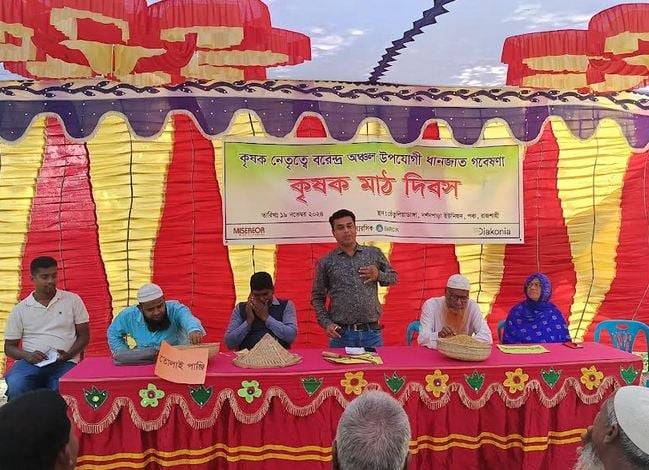Main Points In Hindi (मुख्य बातें – हिंदी में)
यहां टिकाऊ कृषि के लिए किसानों की क्षमता और ज्ञान को पहचानने की आवश्यकता पर दिए गए लेख के मुख्य बिंदु हैं:
-
किसानों की क्षमता और ज्ञान की पहचान: टिकाऊ और पर्यावरण-अनुकूल कृषि के लिए ज़मीनी स्तर पर किसानों द्वारा अर्जित क्षमता और स्वदेशी ज्ञान को स्वीकारा जाना चाहिए।
-
धान के बीज संरक्षण और विविधीकरण: किसानों को धान के बीज के उत्पादन और संरक्षण में रुचि रखने के लिए प्रोत्साहित किया जाना चाहिए, जिससे वे विभिन्न स्वदेशी धान किस्मों को चुन सकें।
-
सूखाग्रस्त क्षेत्रों में उपयुक्त किस्मों का विकास: किसानों द्वारा सूखा-प्रवण क्षेत्रों के लिए उपयुक्त सूखा-सहिष्णु धान किस्मों का चयन उनकी कृषि उत्पादकता को बढ़ाने में महत्वपूर्ण है।
-
किसानों के अधिकारों की रक्षा: कृषि विशेषज्ञों का कहना है कि किसानों और संबंधित लोगों के अधिकारों की रक्षा की जानी चाहिए ताकि वे अपने उत्पादकता को बढ़ा सकें और कृषि विकास में योगदान कर सकें।
- जलवायु परिवर्तन का प्रभाव: जलवायु परिवर्तन के कारण स्वदेशी फसलों की खेती और विविधता को गंभीर खतरा है, इसलिए कम पानी की खपत वाली फसलों को अपनाना आवश्यक है।
Main Points In English(मुख्य बातें – अंग्रेज़ी में)
Here are the main points from the article about recognizing farmers’ capacity and knowledge for sustainable agriculture:


-
Recognition of Indigenous Knowledge: It is crucial to acknowledge the skills and indigenous knowledge of grassroots farmers for the promotion of sustainable and environmentally friendly agricultural practices.
-
Focus on Rice Seed Production: Emphasis should be placed on farmers’ interest in rice seed production and conservation, with some farmers selecting indigenous rice varieties suitable for drought-prone areas.
-
Drought-Resistant Varieties: Farmers are increasingly turning to indigenous rice varieties like Tal-mugur, Swarna Mashuri, and Swarna Rota, which are drought-resistant and require less water.
-
Promotion of Indigenous Crops: Promoting low-water-consuming indigenous crops can effectively mitigate water stress in drought-affected regions, providing a viable solution to the challenges posed by climate change and water scarcity.
- Farmers’ Rights and Interests: Agricultural experts highlight the necessity of protecting the rights of farmers and ensuring they receive adequate recognition and privileges for their significant contributions to agricultural development.
Complete News In Hindi(पूरी खबर – हिंदी में)
टिकाऊ कृषि के लिए किसानों की क्षमता, ज्ञान को पहचान की जरूरत है
राजशाही, 20 नवंबर, 2024 (बीएसएस) – टिकाऊ और पर्यावरण-अनुकूल कृषि के लिए जमीनी स्तर के किसानों की अर्जित क्षमता और स्वदेशी ज्ञान को पहचानने की आवश्यकता है।
साथ ही धान के बीज के उत्पादन एवं संरक्षण में किसानों की रुचि को महत्व दिया जाना चाहिए।
कई किसान अब धान विविधीकरण के अपने चयन के हिस्से के रूप में अपने संबंधित अनुसंधान भूखंडों से तल्मुगुर, स्वर्ण मैशुरी और स्वर्ण रोटा सहित विभिन्न स्वदेशी धान किस्मों का चयन करते हुए देखे जाते हैं।
ये किस्में सूखा-प्रवण बरिंद क्षेत्र के लिए उपयुक्त हैं क्योंकि ये सूखा-सहिष्णु और कम पानी की खपत वाली हैं।
कृषि विशेषज्ञों और विकास कार्यकर्ताओं ने आज जिले के पाबा उपजिला के अंतर्गत तेतुलिया डांगा गांव में किसानों के खेत दिवस को संबोधित करते हुए यह टिप्पणी की।
बांग्लादेश रिसोर्स सेंटर फॉर इंडिजिनस नॉलेज (BARCIK) ने किसानों द्वारा धान की 14 स्थानीय किस्मों के चयन के अवसर पर बैठक का आयोजन किया।
अपने विचार साझा करते हुए 45 वर्षीय किसान सोहेल राणा ने कहा कि उन्होंने बिना किसी रासायनिक उर्वरक और कीटनाशकों का उपयोग किए प्रति बीघे भूमि से लगभग 16-17 मन धान की उपज प्राप्त की।
बैठक को उप सहायक कृषि अधिकारी शरीफुल इस्लाम और अब्दुर रज्जाक, स्कूल शिक्षक मोजिबुर रहमान और BARCIK क्षेत्रीय समन्वयक शाहिदुल इस्लाम ने संबोधित किया।
शाहिदुल इस्लाम का कहना है कि धीरे-धीरे बढ़ती मांगों को पूरा करने के लिए कृषि उत्पादन को बढ़ावा देने के लिए किसानों और अन्य संबंधित लोगों के वैध अधिकारों की रक्षा की जानी चाहिए।
उन्होंने देश के कृषि विकास में उनके विशाल योगदान का उल्लेख किया और कहा कि किसान सभी अपेक्षित विशेषाधिकार प्राप्त करने के हकदार हैं। समग्र रूप से उनके हितों की रक्षा का कोई विकल्प नहीं है।
कम पानी की खपत वाली स्वदेशी फसलों को बड़े पैमाने पर बढ़ावा देना सूखाग्रस्त बारिंड क्षेत्र में जल-तनाव की स्थिति को कम करने का एक प्रभावी साधन हो सकता है।
किसान सोहेल राणा ने भूजल के असामान्य रूप से कम होने से होने वाली तकलीफों का जिक्र करते हुए कहा कि बरिंड क्षेत्र में कम पानी की खपत वाली विभिन्न फसलों का रकबा बढ़ाने की अपार संभावनाएं हैं।
उन्होंने उल्लेख किया कि खतरनाक दर पर चल रहे जलवायु परिवर्तन ने स्वदेशी फसल की खेती और इसकी विविधता को गंभीर रूप से प्रभावित किया है, जिससे खाद्य उत्पादन के लिए वास्तविक खतरा पैदा हो गया है।
Complete News In English(पूरी खबर – अंग्रेज़ी में)
The Need to Recognize Farmers’ Capacity and Knowledge for Sustainable Agriculture
Rajshahi, November 20, 2024 (BSS) – There is a need to recognize the skills and indigenous knowledge of grassroots farmers for sustainable and environmentally friendly agriculture.
Farmers’ interest in the production and preservation of rice seeds should also be valued.
Many farmers are now selecting various indigenous rice varieties, including Talmugur, Swarna Mashuri, and Swarna Rota, as part of their rice diversification efforts from their research plots.
These varieties are suitable for drought-prone Barind regions as they are drought-resistant and require less water.
Agriculture experts and development workers made these comments today during a farmers’ field day in Tetulia Danga village under the Paba sub-district.
The Bangladesh Resource Center for Indigenous Knowledge (BARCIK) organized a meeting on the selection of 14 local rice varieties by farmers.
Sharing his views, 45-year-old farmer Sohel Rana mentioned that he was able to harvest approximately 16-17 mond (a local unit of measurement) of rice per bigha of land without using any chemical fertilizers or pesticides.
The meeting was attended by Sub-Assistant Agricultural Officer Shariful Islam, Abdur Razzaq, school teacher Mojibur Rahman, and BARCIK regional coordinator Shahidul Islam.
Shahidul Islam emphasized the importance of protecting the legitimate rights of farmers and others to boost agricultural production in response to growing demands.
He highlighted the significant contributions of farmers to the country’s agricultural development and stated that they deserve all necessary privileges. There is no alternative to safeguarding their overall interests.
Promoting indigenous crops that require less water can be an effective strategy to mitigate water stress in the drought-prone Barind region.
Farmer Sohel Rana pointed out the challenges caused by unusually low groundwater levels, noting the tremendous potential for increasing the area under cultivation of various low-water-consuming crops.
He also mentioned that rapid climate change is severely impacting the cultivation and diversity of indigenous crops, posing a real threat to food production.


This text summarizes the need to recognize the skills and indigenous knowledge of farmers for sustainable agriculture, highlights the importance of their interest in rice seed production, and discusses the challenges posed by climate change and water scarcity in the Barind region.








